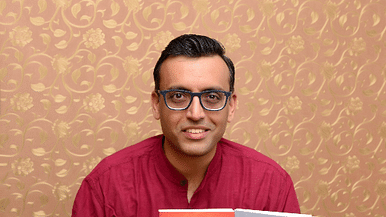New Delhi: IIM-Bengaluru alumnus and Hindi writer Nityanand Misra has a message for the Modi government: Not “Modi sarkar”, refer to the administration as “Modi shasan”.
In fact, Misra would really like it if, not just the government, but people in general would stop using Urdu words while speaking in Hindi and use Sanskrit instead, as he stated in an address last week at the India International Centre (IIC) in Delhi.
Misra, who has authored multiple books in Hindi and Sanskrit on Indian culture and Hindi language, was speaking at an event organised by Srijan Foundation, which describes itself as an organisation that “supports the idea of India as a civilisation, philosophy and tradition”.
The foundation is known to organise events where guests primarily include subscribers of the Right, like the controversial Hindutva ideologue Rajiv Malhotra.
Addressing a packed hall with nearly 150 attendees at the IIC event, Misra talked about replacing Urdu and Arabic words that have crept into Hindi with their Sanskrit and Prakrit alternatives.
Among the examples cited was the aforementioned suggestion, and the word “sahastra” instead of “hazaar” (thousand).
There was advice for the Bharatiya Janata Party (BJP) too: It’s slogan “namumkin ab mumkin hai” should ideally be “asambhav ab sambhav hai” (impossible is possible now).
Also read: UGC says neither Hindi nor any other subject is compulsory, up to universities to decide
‘Two separate languages’
Misra joined the finance sector after securing an MBA from IIM-Bangalore, but has been working for the promotion of Sanskrit and Hindi since 2016, also appearing on various platforms alongside Rajiv Malhotra and other Hindutva ideologues.
The books he has authored include Mahaviri: Hanuman-Chalisa Demystified; OM Mala: Omkar ke Arth; and Kumbha: The Traditionally Modern Mela.
Speaking to ThePrint, Misra said Hindi and Urdu are two separate languages and “should be spoken like that as well”.
“Hindi should have more words from Sanskrit and Prakrit and not Urdu and Arabic,” he added.
Pointing out that words in other Indian languages such as Bangla, Marathi, Gujarati, Kannada, Telugu and Malayalam have also been derived from Sanskrit, he added, “Usage of Sanskrit and Prakrit in Hindi will also help Hindi to reach out to South Indians. I am not against Urdu and Arabic, I am just in favour of Sanskritised Hindi,” said Misra.
A similar suggestion had emerged from the RSS stable in 2017, when the Sangh-affiliated NGO Shiksha Sanskriti Utthan Nyas recommended that Urdu words be purged from Hindi textbooks in schools. However, Misra said he was not associated with the Sangh and that his campaign for Urdu-free Hindi was independent.
Asked about inviting Misra as a guest, Deepika Pathak of Srijan Foundation said the organisation kept “organising such talks with people who are doing work on Indian culture and have a different perspective to share”.
“We do this to make people aware about the unheard side of Indian culture. We found that Nityanand Misra was doing some good work for the promotion of Sanskrit and hence contacted him,” she added.
Also read: Why Hindi is causing stress for officials in Ramesh Pokhriyal’s HRD ministry
‘Making Hindi pure’
Misra’s supporters who attended the event agree with the idea of making “Hindi pure”.
“I completely agree with the idea that Hindi should be made Urdu-free,” said Jagdish Chandra Bhatt of the Bharatiya Bhasha Andolan, an organisation that works to preserve languages. “They are two different languages and that is how they should be treated. People can speak whatever they want, but, when it comes to writing, the language should be devoid of any influences.”
Hindi experts, however, said the idea would spell the end of a beautiful language that had come to be known as “Hindustani”.
“Those who say don’t use Urdu words in Hindi themselves speak at least half the sentence in Urdu while saying it,” said Indian lyricist, musician and screenwriter Swanand Kirkire, who primarily works with the Hindi language.
“Language constantly changes and takes references from other languages, that is how trends come in,” he added.
“Like, for example, the expression ‘vaat lagna’ is essentially Marathi but it is now being used in Hindi as well. Hindi movies use it so often,” Kirkire said, adding: “There are so many other expressions that have made themselves a part of Hindi and gelled so well.”
“The language that we use is a mix of Hindi and Urdu, which is Hindustani, let’s not call it Hindi,” he said.
Professor Apoorvanand, who teaches Hindi at Delhi University, said Misra’s idea was “idiocy of the first order”.
“No language can be completely pure. If you see other languages, there are influences in them as well,” he said.
“If the person wants to replace Urdu words in Hindi with Sanskrit, let him first find the alternatives, go and talk to people in that language and see how they react,” Apoorvanand said, adding, “Sanskrit is not a language everyone will understand. It is, in fact, a language that has been denied to a certain section of society, like the peasants, labour, people belonging to the lower castes. This is a question that has been ignored forever by those trying to promote Sanskrit.”
Another Delhi University professor of Hindi, Chandrashekhar Rawat, echoed the claim.
“If a language does not evolve with time, it will cease to exist, just like Sanskrit did,” he said. “Nobody speaks Sanskrit any more because the language has not kept up with time.”
Approached for comment, the official Hindi division of the central government refused to weigh in on the debate.
A senior official in the human resource development ministry, however, said the government “has been doing everything in its capacity to promote the Hindi language”. “Now, even the HRD Minister has put an impetus on the language,” the official added.
